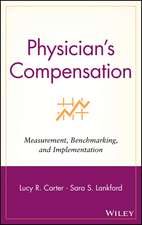Beginnings Count: The Technological Imperative in American Health Care. A Twentieth Century Fund Book
Autor David J. Rothmanen Limba Engleză Hardback – 31 iul 1997
Preț: 201.94 lei
Preț vechi: 246.88 lei
-18% Nou
Puncte Express: 303
Preț estimativ în valută:
38.64€ • 42.11$ • 32.56£
38.64€ • 42.11$ • 32.56£
Carte tipărită la comandă
Livrare economică 12-18 aprilie
Preluare comenzi: 021 569.72.76
Specificații
ISBN-13: 9780195111187
ISBN-10: 0195111184
Pagini: 208
Dimensiuni: 147 x 217 x 21 mm
Greutate: 0.42 kg
Ediția:New.
Editura: Oxford University Press
Colecția OUP USA
Locul publicării:New York, United States
ISBN-10: 0195111184
Pagini: 208
Dimensiuni: 147 x 217 x 21 mm
Greutate: 0.42 kg
Ediția:New.
Editura: Oxford University Press
Colecția OUP USA
Locul publicării:New York, United States
Notă biografică
David J. Rothman is Bernard Schoenberg Professor of Social Medicine, Professor of History, and Director of the Center for the Study of Society and Medicine at the Columbia College of Physicians and Surgeons. Trained in social history at Harvard University, he has explored American practices toward the deviant and dependent. In 1987 he received an honrary Doctor of Law degree from the John Jay School of Criminal Justice. In 1983 he joined the Columbia medical school faculty and his recent work has addressed the history of bioethics and human experimentation along with the social policy implications of organ donation and care at the end of life. Among the books he has authored are The Discovery of the Asylum (1971) and Strangers at the Bedside (1991). He has also co-authored The Oxford History of the Prison (1995).














